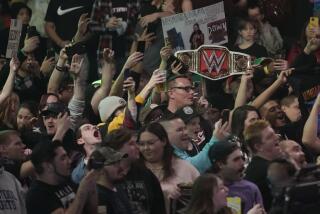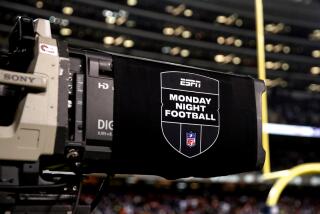Challengers Take On Pro Wrestling Titans
- Share via
MIAMI — Bernie Siegel knew he was on to something the night that the Cuban Assassin renounced Fidel Castro and hugged the vice mayor of Sweetwater, Fla., in the middle of a wrestling ring.
With the metamorphosis from villain to hero completed, the Assassin body-slammed his opponent, Lucifer, to the delight of a frenzied crowd of mostly Cuban Americans.
“That’s life in South Florida when you’re promoting professional wrestling,” said Siegel, a 46-year-old attorney and sports agent.
Siegel and his partner, Bill Brown, own the Sunshine Wrestling Federation, a closely held company gaining notice for rejuvenating pro wrestling in Florida after years of neglect.
Small regional promoters across the country are looking to Sunshine as they try to forge niches in the shadow of two heavyweights that pull most of the strings in the $360-million industry: Atlanta-based Turner Broadcasting System Inc.’s World Championship Wrestling and Stamford, Conn.-based TitanSports Inc.’s World Wrestling Federation.
“Bill Brown is the most successful minor-league promoter in the country,” said Johnny Diamond, a former wrestler who runs the Northern Wrestling Federation in Cincinnati. He added: “Wrestling is very profitable.”
Sunshine’s revenue will quadruple this year to $200,000, its owners said, and there are plans for television shows, videos and other merchandising.
The company puts on about three shows a month drawing crowds of 600 or more at venues across South Florida. Sunshine, which set an attendance mark of 4,400 on July 1, has a profit margin of about 40%. The company declined to release specific earnings results.
There’s even talk of taking the company public if revenue expands as Brown and Siegel predict--into the millions of dollars in four or five years.
The idea isn’t far-fetched. Billionaire businessman H. Wayne Huizenga just announced plans to sell shares in his Florida Panthers National Hockey League team to help finance a new arena.
The initial offering is expected to find plenty of buyers, especially after the Panthers made it to the Stanley Cup finals this year.
Other professional sports have had public ownership at times too. The stocks are attractive to fans who think owning a piece of their favorite team is more important than collecting high returns, said Paul Much, a senior managing director with investment bank Houlihan Lokey Howard & Zukin.
“Pro wrestling is one of the ultimate forms of entertainment,” he said, adding that few people in the investment business, himself included, know much about the economics of wrestling.
*
Sunshine came to life with a benefit show Brown staged for National Guard troops during the aftermath of Hurricane Andrew in 1992.
Brown, a 42-year-old insurance broker, has been around wrestling all his life. His cousin, Frank Dillenger, is a former wrestler, and he grew up going to Wednesday night matches in the Miami Beach Convention Centers.
In those days, a circuit would travel from one city to the next in Florida. Monday was West Palm Beach; Tuesday was Tampa, Thursday Jacksonville and so on.
“All the major stars were here,” said Pat Tanaka, a Tampa-based wrestler, once known as the Orient Express.
Gradually, the major federations froze out most regional promoters by storming television with dozens of shows a month and paying top dollars to wrestlers. Some of the stars became household names. Hulk Hogan even graced the cover of Sports Illustrated back in the mid-1980s.
The big federations, though, play only to huge arenas and charge $20 to $30 a ticket. They may only come to a city like Miami once or twice a year and the wrestlers spend little time with the paying faithful, Siegel and Brown said.
Sunshine’s matches are different. Ringside seats cost just $10, and gate receipts are often shared with a local charity. Each show has an intermission where wrestlers come out to mingle with the crowd and sign autographs.
“They gear it to the kids, and that’s why we like it,” said Bob Hill, commissioner of the Tamiami Colts Youth Football Assn., which is part of an event next month.
But can something this Main Street take the next step and grapple in a free-for-all world dominated by major media companies, such as Turner Broadcasting?
Like with most small business, it’s probably a question of money. With enough capital, Sunshine could hold 48 events a year across Florida instead of the 20 or so planned for this year, Brown said. An alliance of regional groups could even challenge the two major federations, he said.
More to Read
Go beyond the scoreboard
Get the latest on L.A.'s teams in the daily Sports Report newsletter.
You may occasionally receive promotional content from the Los Angeles Times.










